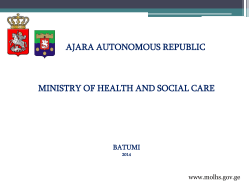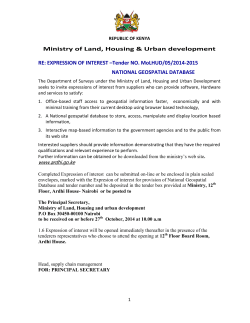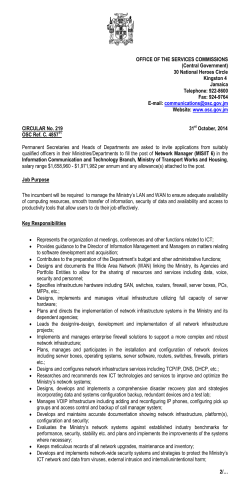
Strategic Environmental Assessment and
Strategic Environmental Assessment and ecosystem services for regional planning in Chile: From understanding to practice Daniel Rozas-Vásquez1, Davide Geneletti2, Christine Fürst1, Francisco Muñoz3 1 Center for Development Research. University of Bonn 2 Spatial Planning for Sustainability Lab. University of Trento 3 Laboratorio de Planificación Territorial. Universidad Católica de Temuco “Even the most effective framework, methodology and/or set of methods is of little value in a regional planning context if a common understanding and vision is lacking (Modified from Noble et al. 2012). This is especially relevant to those responsible for making and implementing the decisions in different institutional scales” Methodology General methodological framework Research context and ecosystem services integration in spatial planning Questionnaire application a b c Some examples of application with Consultants (a) and public institutions (b,c) Results Participants in the questionnaire application by region, institution and the principal function. Flow of hierarchical interactions starting with the PPP elaboration to the territorial system where they have influence Objective Identifying the variety of understanding/visions about SEA and ecosystem services from the different actors involved in the spatial planning process. Research Stages In current development Region II II III RM RM RM RM RM RM RM VI VI VI VIII VIII VIII VIII VIII IX Institution Ministry of the Environment (Regional office) Universidad Católica del Norte (University) Ministry of Housing and Urban Planning (Regional office) Universidad Central (University) Sub Secretary of Regional and Administrative Development (National office) Fundación Chile (Consultant) Ministry of the Environment (National office) Ministry of the Environment (National office) Ministry of the Environment (National office) Universidad de Chile (University) Regional Government Regional Government Ministry of the Environment (Regional office) Universidad de Concepción (University) Regional Government Ministry of the Environment (Regional office) Ministry of Housing and Urban Planning (Regional office) Ministry of Housing and Urban Planning (Regional office) Ministry of Housing and Urban Planning (Regional office) Function Person in charge of the natural resources, waste and risk assessment Researcher Person in charge of environment and spatial planning instruments Researcher / Director of the diploma course in SEA Adviser in the Department of Policies and Decentralization Environmental project analyst Professional of the Department of Environmental Economics Office of Environmental Assessment Office of Environmental Assessment Researcher Person in charge of the Spatial Planning Division Person in charge of the Spatial Planning Division Professional of the Environmental Coordination Section Researcher Person in charge of SEA Person in charge of SEA Analyst of the Department of Urban Development and Infrastructure Analyst of the Department of Urban Development and Infrastructure Chief of the Department of Urban Development IX IX IX Regional Government Instituto de estudios del Hábitat. Universidad Autonoma (Consultant) Regional Government Person in charge of the process of planning and territorial development Environmental coordinator Person in charge of the Territorial Information Section IX IX Regional Government Ministry of the Environment (Regional office) Person in charge of the process of planning and territorial development / Secretary of the Regional Commission of the Coastal Land Use Person in charge of SEA and climate change IX Laboratorio de Planificación Territorial. Universidad Católica de Temuco (Consultant) Project coordinator IX IX IX Laboratorio de Planificación Territorial. Universidad Católica de Temuco (Consultant) Environmental analyst Ministry of Housing and Urban Planning (Regional office) Spatial planning analyst/ Environmental coordinator Centro de estudios TerritorioMayor. Universiad Mayor (Consultant) Director IX XIV XIV XIV XIV XIV XIV X X XI XI Laboratorio de Planificación Territorial. Universidad Católica de Temuco (University) Ministry of Housing and Urban Planning (Regional office) Ministry of the Environment (Regional office) Regional Government Regional Government Ministry of Public Works (Regional office) Universidad Austral de Chile (University) CECPAN (Consultant) Ministry of Housing and Urban Planning (Regional office) Ministry of the Environment (Regional office) Ministry of Housing and Urban Planning (Regional office) Researcher / Coordinator of the Laboratorio de Planificación Territorial Chief of the Department of Urban Development Person in charge of SEA Professional of the Strategic Analysis Department Person in charge of SEA Professional of the Planning Department Researcher Geographer in charge of the spatial planning thematic Spatial planning analyst Person in charge of the natural resources, waste and risk assessment Chief of the Department of Urban Development Geographic distribution of the participants Results (Selected closed questions) Key elements to consider during the SEA process Conceptual relation network in SEA understanding among the different actors Government Institutions As per your understanding, what is an ecosystem service? 56.4 % 2 1 46.2 % 30.8 % 20.5 % 7.7 % 7.7 % 7.7 % Consultants Environmental The point of view of The environmental A methodology objectives and the most relevant impacts generated by which allows clear sustainability issues decision makers the spatial plan and precise results Null 7.7 % 7.7 % Habitats and land Recreation and Biogeochemical Photosynthesis uses flood mitigation cycles 5.2 % 2.6 % No response Null 3 4 33.3 % 33.3 % 20.5 % Providing solid information and decision oriented 7.7 % Providing a complete and detailed Providing exact information about environmental report all the possible environmental impacts 61.5 % 25.6 % 23.1 % Essential in the Maps to support the Complex models sustainability analysis decisions "human-ecosystems" 5 No response 6 46.2 % 38.5 % 35.9 % 5.1 % 17.9 % Other 10.3 % The most challenging issues for the ecosystem services integration in spatial planning 53.8 % The most suitable way for integrating ecosystem services in spatial planning 10.3 % 35 30 Categories and subcategories of conceptual components identified in the content analysis Consulted actors Final comments In general, the understanding of SEA is relatively close to what is mentioned in the theory. However, there is still an important number of actors with the traditional EIA in mind, instead of a strategic vision. 15.4 % Regarding to the ecosystem services approach, while most of the respondents involved were able to identify them in a proper way, there exist elements of confusion amongst almost half of the participants. 5.1 % Payment for ecosystem services Hierarchical representation of the most recognized concepts based on their input degree (different size and colors) starting from below to top. Approaches to integrate ecosystem services in SEA and spatial planning The most adequate way to support the decisions through SEA 46.2 % Universities Biophysical assessment of ecosystem services Social assessment of ecosystem services Other Most frequent tools/techniques utilized in SEA 7 25 Other Question 4 4 4 5 5 20 15 10 5 0 5 The most frequent Second most frequent Third most frequent 5 5 6 6 6 6 7 7 7 Answer “others” In the sustainability analysis but not as the essential component Economic diagnosis In the conceptual elaboration of the spatial plan Evaluation of trade-offs and synergies among different ecosystem services The incorporation of the concept in the policy context. Case studies are needed The ecosystem services should not influence SEA but support an integrated territorial analysis Loss/degradation matrices of ecosystem services With a clear and solid conceptual definition Considered irrelevant for an effective application Lack of information about spatial modeling of ecosystem services Limited institutional development Political will Soft systemic analysis Economic valuation and environmental assessment Economic valuation of ecosystem services In relation to the ecosystem services integration in SEA and spatial planning, the most relevant and recognized aspect is the social evaluation. This should be incorporated in the sustainability analysis of the spatial plan. Finally, the network analysis shows the structure of relations between the identified concepts in SEA and the actors who have recognized them. In this stage, the network analysis for the understanding about ecosystem services and the interrelation with SEA and Spatial planning is still in process in this research. Acknowledgements Comisión Nacional de Investigación Científica y Tecnológica (CONICYT-Chile). Programa Becas Chile.
© Copyright 2025









